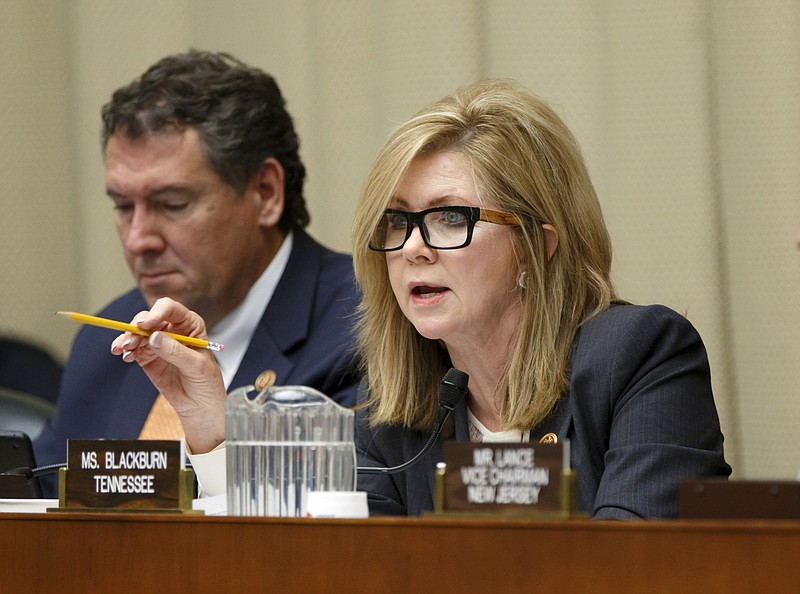In 2014, Tennessee's U.S. Rep. Marsha Blackburn, a Republican now seeking Bob Corker's U.S. Senate seat, joined with Rep. Tom Marino, R-Pa., and wrote a letter to accuse then-DEA Office of Diversion Control Joe Rannazzisi of trying to "intimidate the United States Congress."
Blackburn and Marino also asked for an Inspector General's probe into Rannazzisi - who was issuing fines and trying to make additional cases against pharmaceutical distributors making "suspicious" deliveries of opioids.
"Suspicious," as in 9 million hydrocodone pills delivered over two years to a pharmacy in Kermit, W.Va., where the town's population was just 392 people. And that's just one example.
But Blackburn, who received $120,000 in campaign contributions from the pharmaceutical industry between 2013 and June 2017, didn't stop with eventually pushing Rannazzisi out of the DEA.
She and Marino, in 2015, pushed a bill that substantially raised the legal bar on the U.S. Drug Enforcement Administration's ability to crack down on the drug distributors, including the DEA's ability to freeze suspicious shipments.
Their argument was a complete nonstarter: Sponsors claimed the legislation was needed to let people with pain - think of our veterans - to continue to receive the medication they needed. Would someone please explain how suspending delivery of 9 million opioid pills to a town of 392 people, at least long enough for a reasonable explanation, would keep real doctors and legit pharmacies from providing our veterans with pain relief?
But after the pharmaceutical industry raided key DEA positions and successfully routed other DEA officials like Rannazzisi, the bill was passed in 2016 with no opposition in either the House or the Senate.
Since the congressional interference began with Blackburn's and Marino's initial letter - resulting in the consistent slowing of opioid drug distribution investigations - the opioid crisis has ballooned. And on Sunday, Rannazzisi and several other former DEA officials who worked for him were featured as whistle-blowers on 60 Minutes and in the Washington Post.
Marino, who received $92,500 in contributions from big pharma between 2013 and June 2017, now is President Donald Trump's drug czar nominee slated to lead the Office of National Drug Control Policy.
Trump now says he'll "look into" the 60 Minutes report.
And suddenly, Blackburn is backtracking.
"If there are any unintended consequences from this bipartisan legislation - which was passed unanimously by the House, Senate and was signed into law by President Obama - they should be addressed immediately," her spokesperson said.
What happened to DEA's Rannazzisi - who was overseeing 100s of agents investigating opioids addictions - trying to intimidate Congress?
The shoe was really on the other foot.
The timeline goes something like this, according to 60 Minutes and the Post:
In 2008, DEA's Rannazzisi and team had identified three primary distributors that seemed to have the most suspicious orders and deliveries: Cardinal Health, McKesson, and AmerisourceBergen, who among them control probably 85 or 90 percent of the drugs going out to pharmacies, clinics and doctors.
In 2008, the DEA fined McKesson $13.2 million and Cardinal Health $34 million. In seven years, distributors' fines totaled more than $341 million. The companies cried to Congress that DEA regulations were vague and the agency was treating them like a foreign drug cartel.
Cardinal went to Rannazzisi's bosses to push for a softer approach. By 2013, cases that would have easily been approved suddenly weren't good enough.
And in 2014, two Republican members of Congress - Blackburn and Marino - were calling for Rannazzisi to be investigated. They were also talking about new legislation to "raise standards" in drug distribution probes.
What that legislation actually did was abandon the standard of "imminent danger to the public health or safety" which had proven effective for 44 years in favor of a new heightened standard that is practically impossible to meet "and thus a dream for rogue operators who want to remain in business for as long as possible," according to the Washington Post.
The DEA's toughest sanction is to freeze distributors' shipments of narcotics, something that hasn't happened now in almost two years.
Mores than 200,000 Americans have died in this burgeoning opioid epidemic - most in the last few years - but cases have nearly ground to a halt at DEA, thanks to legislation co-sponsored by Marsha Blackburn, 11 other Republicans and two Democrats, all at the behest of those under investigation.
Now Blackburn wants us to believe that she didn't fully understand what the legislation would do?
Perhaps she thinks appearing to lack intelligence is better than being bought.
